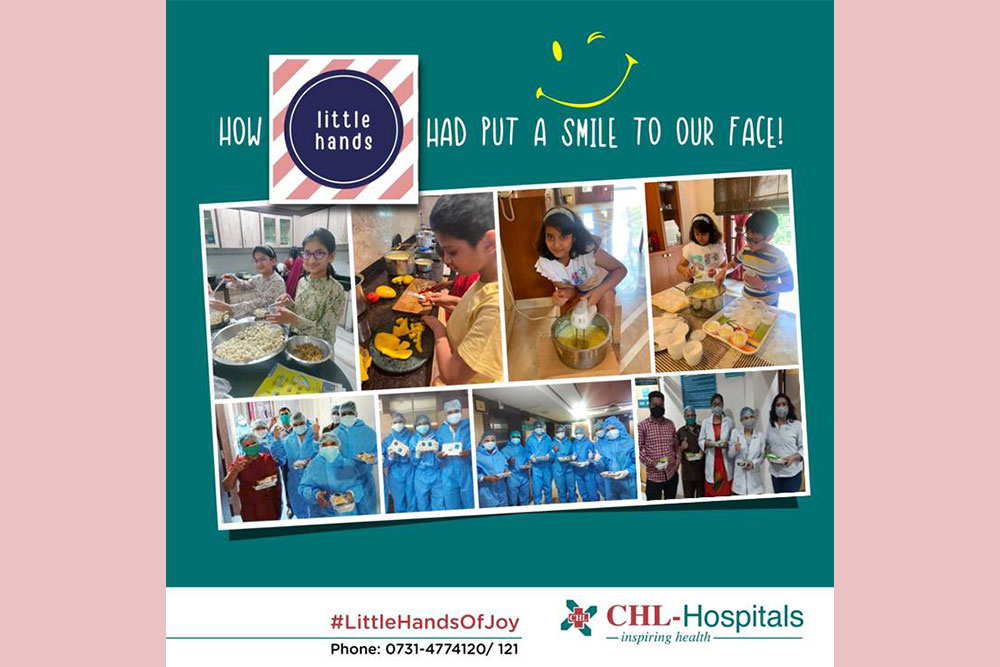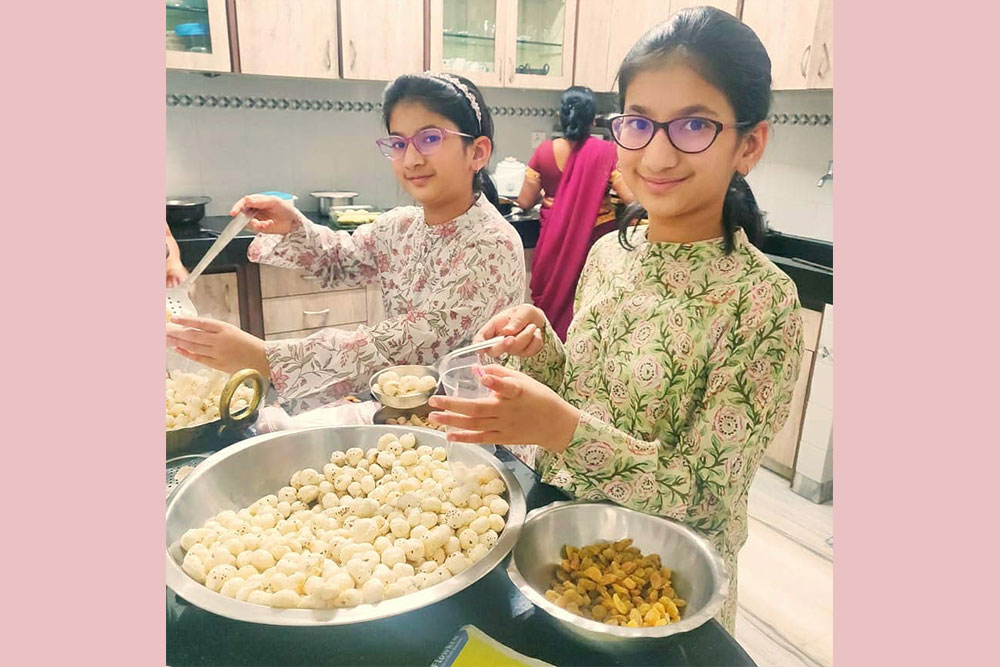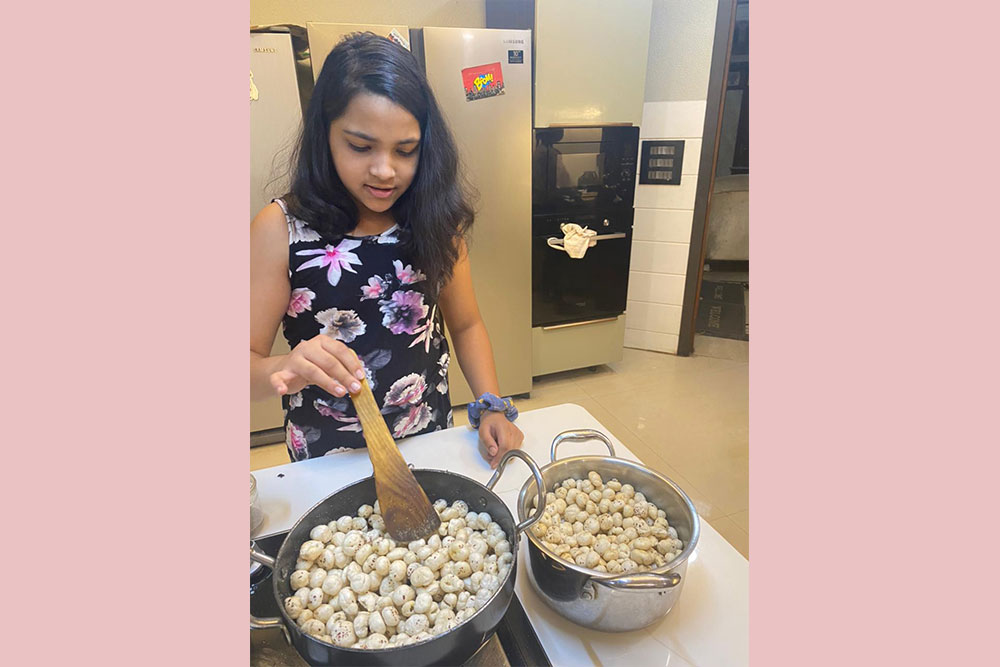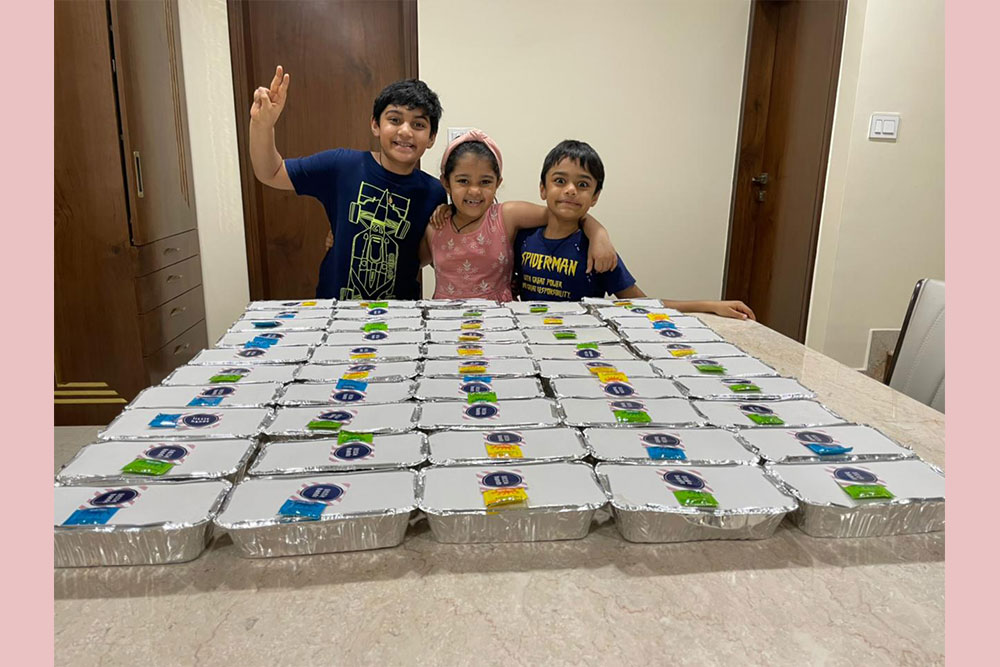Every day since the beginning of May 2021, around 100 frontline workers across Indore—including doctors, nurses, police officers and sanitation workers—have been receiving a little box packed with all the love and care in the world. The box contains a main course dish like Indori poha, pav bhaji, or cucumber and tomato sandwiches, a crunchy element like peanuts and dry fruits, and a dessert like cupcakes and cookies. Occasionally, there’s a glass of lassi or any other drink to go with it.
All of this food is fresh, healthy, homemade, and completely put together by kids as a way of saying ‘thank you’ to the section of our society that is most under pressure during the COVID-19 pandemic: the frontline workers. The children behind this inspiring drive, aptly called Little Hands, are three sisters: 14-year-old Vanshika Sangla, and 10-year-old twins, Advika and Mahika.
The trio started their drive to give back to the frontline workers just about a month ago, and their little community of children has already expanded to 25-30 kids, who are utilising every minute of their precious summer vacations to prepare fresh food every day, pack it up safely, and get it delivered—while maintaining social distancing and all safety protocols possible—to hospitals, police thanas and sanitation departments across the city. Here’s everything you need to know about these awe-inspiring kids and their commendable efforts.

Not just a family affair
It all started when the second wave of the pandemic hit India. The Sangla sisters, especially Advika, were busy spending their summer vacation baking and cooking, when many of their relatives contracted COVID-19. The atmosphere, the girls say, was very negative—and that’s something many of us have experienced during this second wave too. They started putting their homemade goodies together to send across to their extended family, and that’s when the trio’s artist mother, Avantika Sangla, came up with the suggestion that would give them new direction.
“Our mom suggested that we anyways cook and bake so much, how about we show our appreciation to the frontline workers and the work they do by sending them the food we make?” Vanshika says, adding that while many across the country are starting similar initiatives to deliver food to COVID-19 patients, they though their contribution should go towards those playing a key role in helping India recover. “Everyone is at home, safe. But the frontline workers are out there, laying down their lives for other people. These are the people who are sacrificing their lives by treating patients and being away from their families,” she explains.
With the help of their parents, the girls started reaching out to hospitals across the city, and their drive grew from there. “We didn’t think it would become this big,” Vanshika insists. “We initially thought we’ll only do around 50 boxes per week. We did our first delivery of 50 boxes, posted it on social media, and then we got so much support from our family and friends,” she says. “Many people reached out and started giving donations. So, we looped in more kids we knew. There are about 25-30 kids involved, within the age group of five years and 16 years. Now we do around 100 boxes every day, with a total of 5,000 boxes delivered to date.”

The girls managed to strike a good balance between delivering to government and private hospitals in Indore, with a lot of their deliveries going to the Super Speciality Hospital and MTH Women’s Hospital, both treating active COVID-19 cases. Apart from coordinating with 10 hospitals, the girls also coordinate with Indore’s famous “dancing traffic cop”, Ranjit Singh, to reach out to traffic and other police officers who are working every day. They also send across the boxes to various sanitation departments across the city.
Mahika explains the whole process: “We pack the boxes and call the driver we have hired for deliveries. He opens the boot and we put the boxes in. He then reaches the hospital, lets us know, we contact the hospital people, and they come out to take the cartons from the boot. So, social distancing is maintained at every step.” The system is quite efficient, but the girls do miss the opportunity to interact with the people who receive their snack boxes. “If there was an option that we could do the distribution ourselves, see the happiness on their faces ourselves, we would have done that,” says Advika. “That’s not possible right now,” Vanshika interjects, “So, the hospital management send us pictures, and when we see that we get really happy. They send us voice or video messages. They all seem happy, and that makes us happy, and that makes all of our work really worth it.”

When Little Hands join big hands…
This feedback from the frontline workers continues to be a major source of encouragement for the girls. One of the messages they cherish the most, Vanshika reminisces, was a video clip shared by Singh himself. “He sent us a really sweet message saying that if our little hands meet their big hands then we can make great things happen. That was really awesome!”
All this appreciation apart, it’s safe to say that all the kids involved with the drive are learning more every day, and not just about cooking food, but also managing various aspects of a small-scale venture like this, including how to coordinate during the operations, reaching out to more people and managing social media. They are also learning the value of nutrition early on. “We try to make our food as filling and as healthy as possible,” Vanshika says, while Advika, the baking prodigy, explains that they often include eggless, flourless, healthy cookies. The girls are also hoping to include a variety of nutritious cold foods keeping the summer heat and hospital atmosphere in mind.

Will they continue their venture even after their summer vacations are over? Yes, they agree in one voice! “After our summer vacations, we hope to continue our drive for at least once a week, or on the weekends. Even if we don’t do it every day, even if we do it once a week, it will make a difference,” says Advika. In fact, they want to continue this drive even after the pandemic. “We really want to continue even after COVID because the problems of the world, they don’t end just like that,” Mahika explains. “So many women in India don’t get proper sanitation or nutrition. Our focus this summer is on COVID only, but we will try our best to continue this for as long as we can, because giving back to society is really important.”